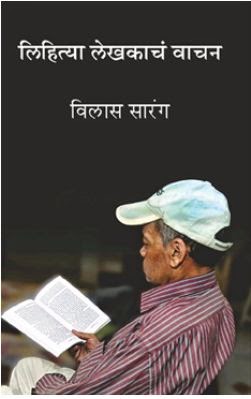"… मराठी साहित्यात समुद्राच वास्तव किती सातत्याने दुर्लक्षित केलं आहे, हे माझ्या विवेचनाच सार होतं… आपण वास्तवाच्या -वाङमयीन सामग्रीच्या- केवढ्या मोठ्या भांडाराला मुकतो आहोत, हे माझ्या लेखात निर्देशित केलं आहे...मराठी वाङमयातील समुद्राची अनुपस्थिती मराठी समाजाच्या संरचनेशी कशी निगडीत आहे, हे माझ्या लेखात स्पष्ट केलेलं आहे."
("वाङमयीन संस्कृती व सामाजिक वास्तव", 2011, पृष्ठ 66-67)
B S Mardhekar / Vilas Sarang:
"...Living is obligatory;
so, too, is dying..."
"… एक आश्चर्याची गोष्ट म्हणजे 'महाभारता'वर आधारलेली सोफिस्टिकेटेड सांस्कृतिक मूल्यावर उभी राहिलेली एकही प्रभावी नाट्यकृती (इतक्या शतकांत) निर्माण झाली नाही, जिने जनमानसावर सर्वकष मोहिनी टाकली आहे. इ. स. 1000 नंतर ज्या प्रकारची संस्कृती रुढ झाली , त्यामध्ये साधारणत्व व विश्वात्मकता हे गुण प्राय: लुप्त झाले...आपली संस्कृती अकाली विश्वात्मक साधारणतेला मुकली आहे."
('वाङ्मयीन संस्कृती व सामाजिक वास्तव', 2011)
विलास सारंग:
"...खरे तर या 'नव' भासणाऱ्या तत्वज्ञानामागे कादंबरीचा जो गाभा आहे तो नवतेला शोभणारा नाही. कादंबरीचा बहुतांश भाग स्त्रीविषयक आकर्षण आणि तदनुषंगाने येणाऱ्या घटना यांनी व्यापलेला आहे. हा सर्व खरे तर ना. सी. फडके परंपरेतला आहे. त्याला नवतेचा थोडा मुलामा दिला आहे एवढेच...."
[किरण नगरकर कृत 'सात सक्कं त्रेचाळीस' (1974), 'मराठी नवकादंबरी', अक्षरांचा श्रम केला, 2000]
I read about his death only a few minutes ago and there is a lot that is not going to come out before I hit the 'publish' button. I will keep coming back to him.
There are dozens of posts on this blog in which I have mentioned him. He was one of the inspirations for this blog.
I said in the very first entry on this blog dated November 29 2006:
"...Vilas Sarang (विलास सारंग), the most under-rated writer/critic in Marathi ever, told: '…..seriousness does not mean solemnity….. Just learn from the poetry of Sadanand Rege (सदानंद रेगे) and Arun Kolatkar (अरुण कोलटकर)'..."
There are two Marathi writers quoted at the top of this blog- one is Tukaram (तुकाराम), the other is Sarang.
For me, he was the greatest Marathi prose-writer ever. [The two close contenders for this honor are Vinoba Bhave (विनोबा भावे) and Durga Bhagwat (दुर्गा भागवत). But I chose Sarang for the sheer range of subjects on which he wrote.]
I have almost all his books, two of them- unpublished, for private circulation- gifted by him to me.
Only on April 4, 2015, hailing him the greatest living Marathi writer, I posted his views on Durga Bhagwat (दुर्गा भागवत), on the Facebook page I maintain.
from 'Lihitya Lekhakachan Vachan' ('लिहित्या लेखकाचं वाचन)
One of the greatest essays in Marathi I have read is his on W H Auden. I just keep reading it.
Here is his translation of one of Mardhekar's poems.
बा. सी. मर्ढेकर, # २१ , "मर्ढेकरांची कविता"
पिपांत मेले ओल्या उंदिर;
माना पडल्या, मुरगळल्याविण;
ओठांवरती ओठ मिळाले;
माना पडल्या, आसक्तीविण.
गरिब बिचारे बिळांत जगले,
पिपांत मेले उचकी देउन;
दिवस सांडला घाऱ्या डोळीं
गात्रलिंग अन् धुवून घेउन.
जगायची पण सक्ती आहे;
मरायची पण सक्ती आहे.
उदासतेला जहरी डोळे,
काचेचे पण;
मधाळ पोळें
ओठांवरती जमलें तेंही
बेकलाइटी, बेकलाइटी!
ओठांवरती ओठ लागले;
पिपांत उंदिर न्हाले ! न्हाले !
Mice Died in the Wet Barrel
Inside the waterlogged drum, the mice are dead,
Their necks hang, wrung by nobody.
The necks hang, and lips meet lips
Without desire.
Poor bastards lived in holes,
And, with a hiccup, died in the drum.
Day spilled into gray eyes,
rinsed their limbs and genitals.
Living is obligatory;
so, too, is dying.
Melancholy has disquieting eyes;
they are glass ones, though.
Even the honeycomb
brimming on their lips
is merely foam rubber!
Lips nuzzling lips:
O the mice are douched in the drum!
the mice are douched!

